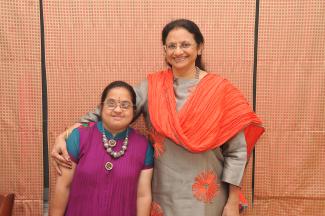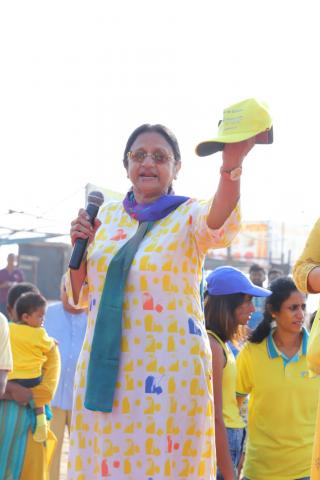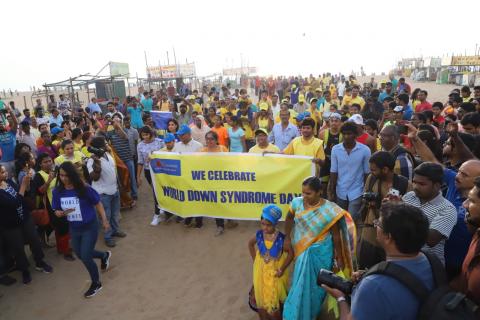
Dr. Surekha Ramachandran, mother of a young woman with Down Syndrome and Chairperson of the Down Syndrome Federation of India sheds light on the myths and misconceptions about persons with Down Syndrome . And a message to all parents on World Down Syndrome Day.
PatientsEngage spoke with Dr. Surekha Ramachandran, founder of Down Syndrome Federation of India. Established in the year 1984, with 6 children, DSFI today serves innumerable children not only around India, but also the Middle East. DSFI has been a constant source of support and encouragement for people who are unable to come to terms with Down syndrome. She also feels very strongly about some of the misconceptions harboured by parents of persons with Down Syndrome.
1. Persons with Down Syndrome are always happy and affectionate
False: Persons with Down Syndrome are human beings first with the same range of moods and emotions. They can feel angry, they can feel sad as much as they can also feel happy. They feel pain, they feel anger and frustration and can sometimes become aggressive when their needs are ignored. They can also withdraw, internalize their hurt and become depressed.
My daughter used to get angry when she struggled to communicate her frustration and resisted our attempts to control her.
So learn to listen. Be patient and try to understand their feelings.
2. People with Down Syndrome are innocent and angelic
False : They are smart in understanding the situation and and can even be manipulative to get what they want. They are very observant and can find ways to work around a given situation and handle people.
For example, they can judge which parent is 'stricter'. Which teacher they can approach more easily? They know when to ask a parent for something they want.
3. People with Down Syndrome cannot live independently
False. Children with Down Syndrome are going to schools. With early intervention and given the Right To Education, parents can ensure that their children go to school, go on to college for higher education and join the work force. There are increasing number of role models in the community.
He works in a 5 Star Hotel
She runs a Cafe
Owner of An Art and Pottery Studio
A Master's Degree in Sanskrit
A Teacher's Assistant in Delhi
4. They can only eat soft foods
Mixed. Often parents feed kids soft foods, mashed foods which they just have to swallow. So they never learn to chew. It is true that children with Down Syndrome have GERD or acid reflux in their early infancy accompanied by frequent vomiting and food rejection. But solid foods must be introduced gradually in small quantities so that the child can learn to chew and eat a wide variety of foods
5. They are not physically active. They cannot cycle or play outdoors
Absolutely False. They can and should play outdoors. Its important for not only their health but also for social skills and participation in the community. Cycling, Swimming, Dancing are all good activities.
Encourage them to make friends. They may be hurt if some kids do not include them but they will learn to back off, deal with the hurt and navigate the social structures. Let them hang out with friends, go shopping, make their own choices.
Its also important to limit gadgets and screen time so they build social skills.
And finally a message from Dr. Surekha Ramachandran to parents on the theme this year: Leave No One Behind.
Your child does not need your sympathy. They deserve their rights.
Your child deserves the same opportunities as another child.
Bring your child out into public places. Go to the park, go to the beach, go to the theatre.
Enroll them in schools and if there is a problem, leverage the RPWD Act and the community of Down Syndrome advocates.
Teach them life skills so they can live independently
Encourage them go out, to work and earn a livelihood
Let people stare. They stare at beautiful people.
Let your child feel proud of who he/ she is.
Your confidence in your child will help your child

Dr. Surekha Ramachandran is the Chairperson of the Down Syndrome Federation of India. She has been instrumental in helping many parents become more confident about the future of their child with Down syndrome by counselling and guiding them. She has started many Parent Support Groups across the country to achieve the goal of an inclusive society. Today if there are many self-advocates in the country, it is thanks to her tireless efforts.







